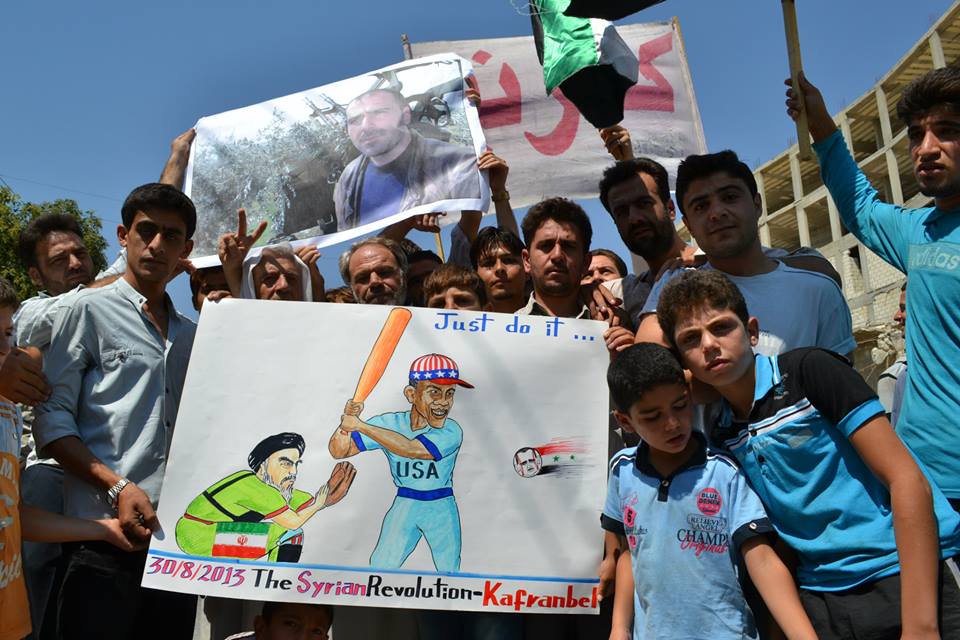Damascenes were clearly taking the threat of U.S. bombardment seriously this past week. As the UN CW investigators were leaving for Lebanon, Syrian state television replaced its usual diet of fashion and food puff pieces with talk show coverage on whether or not the U.S. would strike, as well as emergency broadcasting information (such as whether or not bakeries would be kept open).
But after airing Obama's speech in which he announced he would seek Congressional approval first, the tone of Syrian state newscasters changed to a much more buoyant mood, as did government officials' pronouncements.
Then, the army reportedly renewed artillery strikes against rebel positions near Damascus.
The President's speech, combined with the telegraphing of U.S. plans beforehand defanged the underlying political message that operations like these are meant to convey: there will be more, much more, of this unless you agree to our terms.
The larger problem with that kind of message, though, is that the U.S. does not seem to have any idea what terms it will dictate to Assad. Forty-eight hours to leave his bunker? Accept a 100,000-strong UN peacekeeping mission? New diplomatic talks fully involving the Iranians? A no-fly zone?
For Syrians, the debate has made little difference on the the ground since the CW attacks took place. Many activists, bystanders, and fighters will not lose sleep over how squeaky clean U.S. motives are or are not if a two-day cruise missile bombardment gives Assad a moment of pause (or leads to something bigger) as his forces grind down rebel-held towns.
While some activists fear that further intervention will only worsen the conflict:
"In the course of the revolutionary process, many other actors have also appeared on the scene to work against the struggle for self-determination. Iran and its militias, with the backing of Russia, came to the aid of the regime, to ensure the Syrian people would not be given this right. The jihadis of the Islamic State of Iraq and Sham and others, under the guise of “fighting the Assad regime,” worked against this right as well. And I feel the same way about any Western intervention."
Others are at the end of their ropes:
"it’s not like they’re unconscious of the pros of nonviolent resistance that they began revolting with, … or don’t know about what amerikkan military occupation means after years of hosting traumatized iraqi refugees … it’s a matter of desperate, last resort, life or death yearning for some kind of international reaction, some where, some how."
Despite the promised influx of foreign military assistance, there is little evidence that all of this promised aid has brought the rebels much further than where they have gotten themselves (with some help from the Saudis and Jordanians) in northern Syria, and near Damascus itself, where the CW attack(s) took place.
It is likely that the Syrian regime will frown and bear the cruise missiles just as it has on the occasions this past year when the IAF attacked targets of opportunity. Lebanon is the country most likely to pay a new price in such a scenario of escalation - as Syrians continue to pay an ongoing, very heavy price.
The reason Iran and Russia hold an advantage in this regard is because they have no compunctions about supporting the Assad regime, which is not the case with the rebels, given that there is no comparable rebel government to support, and US allies in the region are worried about further spillover, don't trust each other (Saudi Arabia and Qatar in particular) or some of the rebels themselves (Turkey and Israel especially). Iran, Russia, Hezbollah, and Assad (and Assad's domestic supporters) want the regime to win, to stay in power. The alternative to that is not agreed upon by any of the other non-Syrian players - most of whom would prefer the U.S. do most of the work for them, while the U.S. itself would prefer the "good" fighters sort things out and take care of the "bad" fighters themselves.
What we are seeing here in the Western capitals are the aluminum tube and yellowcake chickens coming home to roost. Everyone has Iraq on their mind. While it is the use of WMDs that has prompted the impetus for direct action, it is precisely because WMDs are being cited that the debate has led to the UK's stated abstention from a future attack and to President Obama seeking political cover from Congress.
Right now, the way the Administration is putting its foot forward makes clear that the strike (if it happens) will be more like President Clinton's bombing of the pharmaceutical factory in Sudan in 1998 than his air war over Kosovo in 1999, or even the NATO campaign in Libya two years ago.
Kosovo is a model under discussion in the news, but it is not the one this Administration appears to be considering. The ceasefire terms in Kosovo that ended the 78-day bombing campaign included the deployment of 50,000 peacekeepers. Intervening was a multi-year, multi-national deployment that required setting up checkpoints, monitoring disarmament, and guarding IDP camps with the implied threat that this force's existence presented to the Serbian regime. Doing something similar in Syria would require an undertaking on par with the Occupation of Iraq, or bigger.
The Administration is having a hard time ignoring the "red line" Obama declared a year ago on chemical weapons - but it is now qualifying its promise that it "will" take action as "should" and "can" take action. No Western power has hinted, either through leaks or public declarations, it is up for much beyond punitive strikes and arms/training missions via Jordan.

